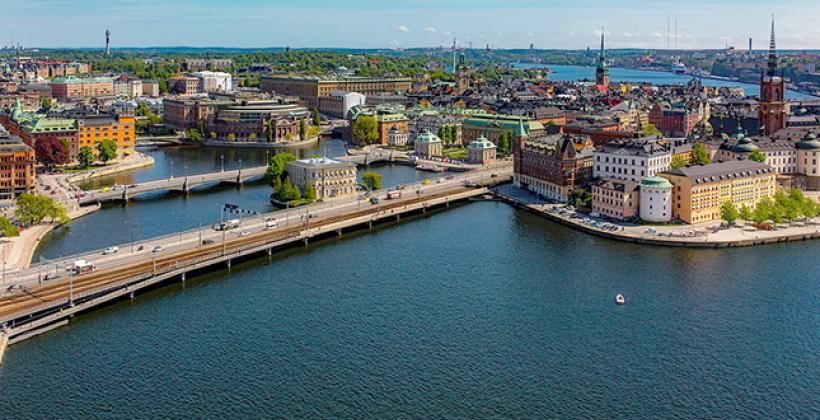
Location
Description
Sweden’s capital city, Stockholm, has been working on climate change mitigation and adaptation since the 1990s. The city is a real frontrunner with well implemented climate action plans and pioneering policies to ensure it meets its ambitious environmental targets. The carbon dioxide emissions have been cut by 25 % per citizen since 1990.
At the same time, Stockholm is growing rapidly and sometimes faces the challenges of both keeping and developing its unique city character. A key priority is to ensure that it remains a sustainable city, while offering an attractive and inspiring living and working environment. The implementation and monitoring of all climate actions undertaken in the city is coordinated by the climate action group. Their long-term aim is to become completely fossil fuel free by 2040.
In this context, within the GrowSmarter project, Stockholm demonstrates 12 smart solutions in the fields of low energy districts, integrated infrastructure and sustainable urban mobility in Årsta, a fast-growing district in the south of the city.
Demo Site Expected Impact
* Detailed information regarding the technical and financial performance will be available at a later stage.
The demonstration site in Stockholm consists of three refurbished buildings with an overall gross floor area of 36 307 m².
The final energy demand of the site is reduced by 3333 MWh every year thanks to the refurbishment. According to SCIS calculations based on energy design data and the respective emission factors available, the primary energy savings go up to 4918 MWh/yr while the CO2 reduction amounts to 1187 tonnes every year.
Technologies
Buildings and energy
* Detailed information regarding the technical and financial performance will be available at a later stage.
The solutions demonstrated in Stockholm within the GrowSmarter project are:
Energy efficiency in buildings
- Retrofitting the building envelope
- Windows with extra low U-values
- Air tightness
- Building services (HVAC and lighting)
- Efficient lighting
- Energy quality assurance
- Heat pumps
Energy systems integration
- Waste heat recovery
- Recovering waste-water heat from the drain
- Waste heat from data centres and vacuum waste systems
- Waste heat from fridges and freezers in supermarkets
- District heating and cooling
- Open district heating with a feed-in of waste heat
Mobility & Transport
- Clean fuels and fuelling infrastructure
- Developing charging infrastructure
- Setting up refuelling facilities for alternative heavy duty fuels
- Electric, hybrid and clean vehicles
- Car sharing
- Green parking index in combination with car sharing pool with electric vehicles
- Bicycle infrastructure
- Electrical and cargo bike pool
- Urban freight logistics
- Integrated multi-modal transport for construction materials/logistics centre
-
- Integrated multi-modal transport for light goods
- Micro distribution of freight
ICT
- Building energy management system
- New adaptive control and regulation techniques for heating systems
- Active house/home energy management systems/smart home system
- Open home net
- Energy visualisation
- Smart plugs, connected lighting and thermostats
- Dynamic price models
- Individual energy metering
- CO2 signal
- Urban data platform
- Big open data platform
- Traffic control system
- Traffic signals synchronised to prioritise certain vehicles for the movement of goods
- Smart guiding to alternative fuel stations and fast charging
Building aspects
- Building Energy Services
- cooling and DHW
- Building Energy Services
- DHW (only)
- Building Energy Services
- heating (only)
- Building Energy Services
- heating and DHW
- Building Energy Services
- lighting and appliances
- Installed Renewable Energy Sources
- photovoltaic - building integrated
- Technology used to supply the buildings
- district heating (DH) network
- Technology used to supply the buildings
- electrical storage
- Technology used to supply the buildings
- heat pump: absorption
- Technology used to supply the buildings
- heat pump: adsorption
Energy Carriers
- Heat/district heat
- Waste heat
- ‘Green’ electricity
Energy Systems Types
- Infrastructure & System Integration
- DHC extension
Mobility Type of Intervention
- Infrastructure
- Vehicles
Thematic Field
- Energy System(s) Integration
- Information and Communication Technologies
- Mobility and Transport
- Refurbished Building(s)
